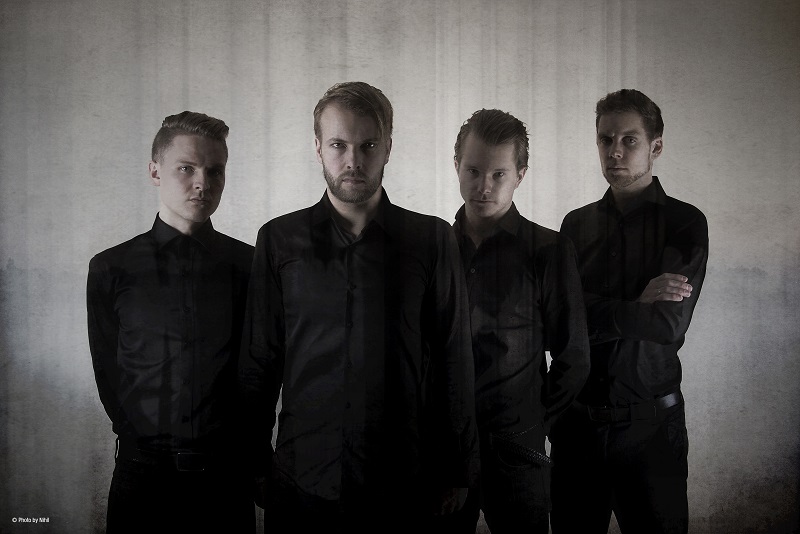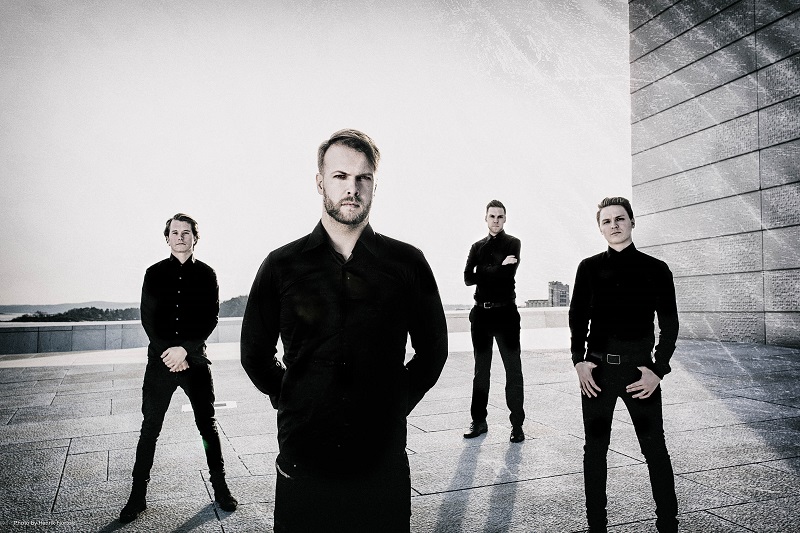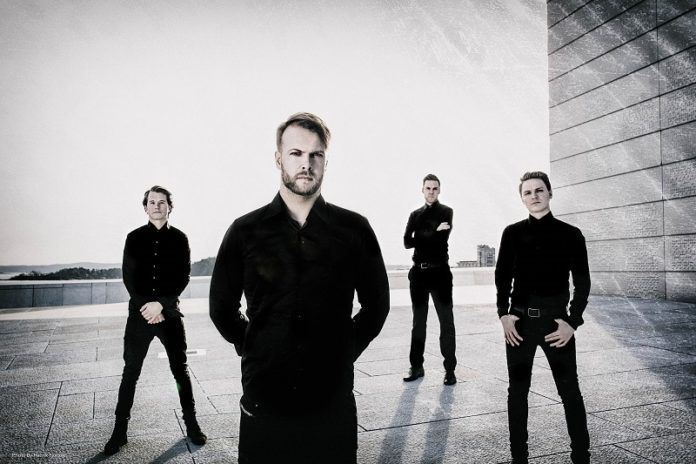“Progressive” is often a catch-all term used to refer to music that defies conventions. If it’s hard to label, then calling it “prog” is the mental shortcut that many use. That’s what happens with Leprous.
Although if you listen to their music you’d be hard pressed to try to put them side by side with the likes of Dream Theater or Symphony X, you’ll also find yourself unable to simply point your finger and say exactly what they are. Well, it turns out that that’s how they like it.
Einar Solberg, singer, keyboardist and the main songwriter of Leprous, seems to enjoy defying labels and letting his music do the talking. This, and more, is what we discussed when we met to talk about their upcoming album The Congregation.
To be ‘progressive’ is to always evolve and challenge.
Metal Blast: I saw Emperor live last year, at both Hellfest and Wacken, when you played with them. How were those shows for you, considering the great expectation that surrounded them?
Einar: I don’t think that any of us thought a lot about the expectation. You rehearse as much as possible, and then you just go and do your thing; people will either like it or not.
I wasn’t very nervous, but then again I had a quite easy task. It’s very old school Emperor, and so it isn’t very challenging on keyboard [laughs] It was a nice and comfortable task, with very nice people. A very nice summer job.
MB: I’ve also seen Leprous live, and I thought it was interesting to see how you approach the music very differently when you’re on stage. With Emperor you almost seem full of anger during the whole thing, whereas with Leprous you seem way more relaxed. How does the approach to your stage presence change depending on which band you’re working with?
Einar: Between Leprous and Emperor, it’s extremely different, especially because of my role in each band. My role in Emperor was extremely small; it’s important, but people are clearly there see Isahn, Samoth or Faust. I’m more in the sidelines, I’m more of a session musician with them.
Leprous, on the other hand, is my project, it is where I express my emotions, and so it is very, very different. I tend to also be pissed off there now then, but it’s just one of many ways in which I express myself. It really would make no sense to have the same stage performance for such different expressions.

MB: I think it’s very interesting to see the “on/off” switch that exists for performers, where you basically create a whole new persona around your role in the band.
Einar: Exactly, and I think that it’s very important for artists to have that switch, because there are those who constantly walk around with their stage persona, and so it’s really hard to have anything to do with them [laughs] You also have the opposite ones, which on stage are the same as they’re on their everyday life, and so they’re very boring to watch.
For me it isn’t like theater, it’s more like going into one part of your personality, and really emphasize it a lot. You need to command some authority on stage, if you can’t do that then people won’t believe in you, you won’t touch the crowd. At the same time, if you try to do the same in your daily life… it doesn’t really work.
MB: I’ve experienced that with some American bands, since the scene there is quite different from the European one, and so there’s a bit more of the “superstar” vibe among performers… and it gets pretty obnoxious.
Einar: Maybe, but I could also mention many examples from the black metal scene in Norway too… but I rather not go into details [laughs] I also know a lot of American bands that are in the complete opposite side.
I think that in the US the “superstar” aspect is a bigger thing. When we play in the States people are much more interested in autographs and stuff like that. Even if they don’t like the band, or people that don’t even know it, they just say “OH, YOU’RE IN A BAND? THAT’S AWESOME!”, and so they think it’s something really big.
Personally, I don’t have any negative experiences with American bands, but I can see how that can happen.
MB: Now, before we get into Leprous, and since you’ve played a role in black metal, how do you feel that scene has changed over the years? It started in the 90’s full of some philosophical undertones, and now it’s kind of just part of the mainstream heavy metal environment, it’s no longer shocking.
Einar: It’s like everything that is new and shocking; it loses that edge eventually. I mean, Black Sabbath were incredibly shocking when they came out. When black metal started in Norway it was so extreme, with the murders and church burnings, that it was bound to get a lot of attention and headlines everywhere.
It started out kind of like a “be whatever the fuck you want to be“ philosophy. Eventually, however, it actually turned into one of the more narrow-minded and conventional musical scenes that I can think of. You are expected to follow a specific set of rules, otherwise you are “not true” or you are “gay,” or whatever. They have an audience that very easily becomes aggressive if you change something too much, or if you do things differently. The whole point of the black metal attitude is gone when you just start to just follow rules and expectations like that.
I’ve never considered myself to be a black metal musician, but I have some connections with many people from that environment, and so I kind of know what it’s about. It was about just doing whatever the fuck you wanted.
MB: Precisely, it was about breaking with the conventions, and yet suddenly black metal just became this genre that is full of conventions.
Einar: Exactly, and I think that it’s the worst within the metal scene. I think it has become the most “conventional” of all.
Luckily, a lot people like black metal out of many things they like, and then it’s completely different. Those who are really hard to impress are those who consider themselves to be TRVE black metal fans.
MB: Speaking of genres, and moving on to Leprous; once you said that the term “Progressive” had diluted to the point that it was just equated with having a song that had “one or two odd-time signatures and a guy that is really good with the guitar.” So, with that in mind, how would you prefer to define “progressive music”, and do you even feel Leprous belong to it?
Einar: I wouldn’t like to define it, because I think that when you start defining things too much you create prejudices on people, and so they will expect to hear a specific thing. Genres are usually defined by 3 or 4 bands, by pioneers, and then you have the rest of the people, the majority, who follow them… then there are the few who move the genre, who experiment with it. The only thing that you can do as a musician is to just follow your inner vision and remove all those expectations around you. If it ends up being something that, as in the case of Leprous, people end up defining as “progressive”, I’m OK with that.
People have the need to label things, and to put them in little boxes. If I have to be in a certain label I think progressive is a nice one, because prog enthusiasts are often very open minded and open for challenges and for new things. I actually think that’s what it is to be “progressive”, to always evolve and challenge, to never rest upon your previous works (or those of somebody else), and to constantly move forward.
Within progressive music you have everything; from Dream Theater to Messhugah, to King Crimson. These are bands that do not resemble each other at all. It’s kind of an open genre, much more so than others, like thrash or doom metal, where there are many more rules, even down to the dresscode! [laughs] You need to have your denim jackets with patches and all that. [laughs]

MB: It’s the funny thing about metal. It starts as a “fuck you to society”, and then becomes this very exclusive club with lots of rules, and where people wear a uniform.
Einar: [Laughs] Yeah, exactly. I think that a lot of people, especially younger people, need to feel that they belong somewhere, so that’s responsible for a big part of those “identity crises.” They’re not so sure about themselves, and so they’re jumping on something that gives them an opportunity to develop an identity and a connection with others.
I remember my very childish views on that kind of things when I was young. I could only wear black, my hair had to be long and black, and if the music wasn’t heavy enough, I didn’t like it. It was all a big lie; when I look back on it I see that it was just something I felt that I had to say because of the label I had given myself.
MB: Well, genres themselves are often meaningless. Many times they are just things that a label might come up with to promote a band, to make it easier for reviewers or stores; they lose the meaning when you receive promos that just pile shit up, like “avant garde black metal thrash jazz-fusion” etc.
Einar: [Laughs] People want their band to be special, and they want it to be unique. People are all the time sending me things on Facebook saying that they’re really unique, and when I listen to it I just think …”what the fuck are you even talking about?!“ They’re things I’ve heard a billion times before, and which would work just the same without an exotic label on it. [laughs]
People like to complicate things in order to make them more interesting.
MB: Speaking of complications, I read that The Congregation was the most challenging album for Leprous so far. Why?
Einar: We had just lost two members, and so we had to forget all the previous methods in which we wrote music. I took the matter into my own hands, and started writing two sketches every week, once for each rehearsal, until I had 30. I forced myself to do it, even if I was at night shift at work, or in the train on the way home. When I was completely uninspired I forced myself to do it; although it was very tiring, it was an extremely rewarding way of working, because even though sometimes you might think you are completely uninspired, you end up writing some of the best materials you’ve ever written. Of course, the opposite can also be true, and you’ll think you’re very inspired and you’ll just write bullshit. The point is that you shouldn’t just sit and wait for that inspiration, you should just produce, produce, produce, then listen, listen, listen, evaluate, evaluate, evaluate, and then choose, throw away, listen again, evaluate, and change what needs to be changed.
This is how this album was different; we didn’t leave anything to chance, we wanted everything to be perfect. It was a continuous work; I worked on this all year, without any proper rest, it was hanging over me all the time.
MB: Regarding losing two members; was the songwriting divided among all of you before?
Einar: On the previous albums I also had the majority of the albums, but we used to meet and jam on the rehearsal room. We would make many changes together on the rehearsal room, with the chemistry that we had built over the years. This time everything was planned at home, in advance, to a much larger degree than before, and mostly by me.
MB: Considering that Coal, your previous album, did quite well, how tempting is it, when you have a situation like that, to sort of repeat yourself, knowing that it works?
Einar: You need to start each new album with a blank sheet; if you don’t do that, it’d be like a painter that paints on top of another work. You need to start from scratch, not to linger in the past, and to always look forward, evaluating what you’ve done. This is how you really manage to advance.
You have to forget about the expectations of people, because if you start thinking about those things you will destroy all of your honesty. You will produce something halfway, out of fear of not being accepted. It’s very important for me to just block out the rest of the world.
MB: Well, that’s what Leprous have done since the beginning. Every album has represented a step forward, and I’m sure that The Congregation will also be like that; a new chapter for a band that is growing more and more, and that I hope will take the place that it deserves in the metal scene. Einar, thank you very much for your time. Anything to say to your fans?
Einar: Thank you for the words, and I hope we’ll see everyone on the road. We’re planning some pretty extensive touring, so I hope to see you there!



it’s a very interesting interview, thanks